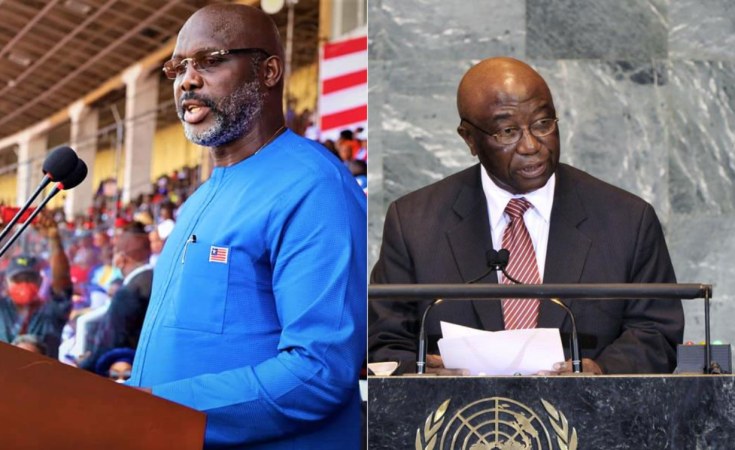Monrovia — Liberia's highly anticipated presidential and legislative elections have concluded, with a few exceptions where ballot papers and election materials arrived late. The National Elections Commission (NEC) has pledged to extend the polls to ensure that every Liberian can exercise their constitutional right to vote. However, despite the high turnout expected, several irregularities and challenges have emerged, potentially leading to an increased number of invalid votes.
One significant issue is the design of the ballot papers. The three types of ballot papers - presidential, Senate, and House of Representatives - are unusually long compared to previous elections. This elongation poses a risk of ink bleeding through the paper when voters mark their choices with ink and try to fold them, potentially invalidating their votes.
Additionally, in some areas, the boards used to press on the ballots were sloping, causing some voters to hold the ballot papers in their hands while marking them. This has raised concerns about the possibility of more invalid votes.
Renowned talk show host Nathaniel Vah of Kool 91.9 FM said at the Paynesville Community School precinct, voters struggled to mark their papers.
"There is a need for the National Elections Commission to fix the damaged boards to address the situation. Voters are facing constraints to mark their ballot," Vah said.
The high percentage of invalid votes in Liberia's post-war elections and referendums has been a recurring concern. In the 2020 national referendum, invalid votes accounted for over 60 percent of the total votes. In the 2017 presidential and legislative elections, about five percent of the votes in the first round of the presidential elections were invalid.
Another contentious problem was the poor visibility at polling centers. In the early morning and afternoon hours, some polling stations were inadequately lit, requiring voters to use their phone or flashlight to mark their ballots behind the voting screen. This raises concerns about voters incorrectly marking the ballot papers.
"Everywhere is dark. It was hard for me to see the ballot papers. As young as I am. What about the elderly who have weak eyesight. They might likely cast invalid votes," Patricia Dweh told FrontPage Africa at the Mt. Carmel School precinct in the GSA Road Community, District #6, Montserrado County.
Addressing the issue of poor lighting during an NEC election day press briefing, Chairperson Davidetta Browne-Lansanah acknowledged the problem and stated that it was not unprecedented. She noted that the NEC had faced similar constraints in the past and had used lamps or torch lights for vote counting.
"At the Kendeja schools, we were told that the rooms were dark and we should make something available. And we have supplied lamps and torch lights. In fact, we have used torch lights and phone lights in the past, and we can use them again," she said.
Voters Complain of Slow Process
At the Matadi Community School voting precinct in Montserrado District #9, where the CPP standard bearer cast his vote, voters complained of a slow-paced process due to a single door being used as both an entry and exit point. According to polling staff, the principal locked the back door of the school building that should have served as an exit and took away the keys on grounds that she wanted to safeguard the school's documents.
One frustrated voter, William Faryiah, stated that he had joined the queue at 6am but had not cast his vote by 12 midday.
Another voter, whose name is withheld, alleged that polling staff were not giving priority to the elderly, pregnant women, and mothers with babies due to overcrowding.
Other irregularities included the late arrival of ballot papers, the failure of NEC polling staff to show up at polling centers, and the subsequent understaffing of those centers.
Several precincts in downtown Monrovia, including St. Samuel High School, Rally Town Market, Monrovia Demonstration Public School, GW Gibson High School, St. Simon Baptist School, and Tubman High School, reported various irregularities.
At St. Mary High School, more than five voters confronted NEC staff when their names were not found on the voter roll.
In Grand Bassa, an elderly woman named Mary, who had gone to cast her vote at the Baifra Polling Center, was rushed to the Liberian Government Hospital after falling and narrowly escaping death while waiting her turn to vote.
There have also been reports that some polling centers had fewer than the accepted 550 ballots, leading to voting delays. However, the NEC Chairperson assured that when such errors occurred, additional ballot papers were borrowed from other polling centers, with replacements to follow later by the supervisor.
'We are humans'
During the press briefing, Madam Lansanah acknowledged that the NEC was aware of some of these difficulties, but acknowledged that NEC staff were human and susceptible to making mistakes. She emphasized that when minor errors occurred, the NEC made every effort to correct them, and these elections were no exception.


